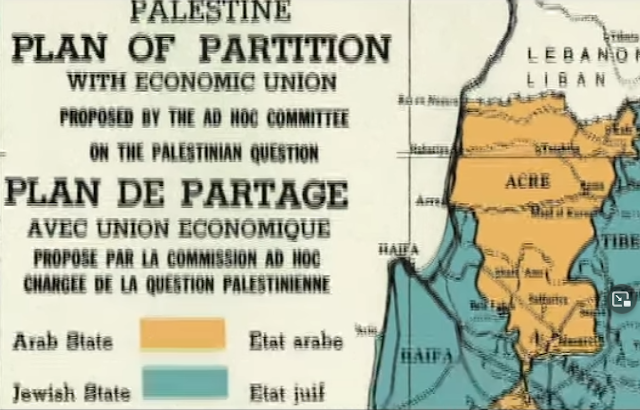On the 29th of November 1947, the UN General Assembly voted on Resolution 181, adopting a plan (the United Nations' 1947 Partition Plan for Palestine) to partition the British Mandate into two states, one Jewish, one Arab. Israel's Foreign Affairs Agency characterizes it's significance :
UN General Assembly Resolution 181 remains relevant even today for three key reasons: Resolution 181 confirmed the 1922 recognition by the international community that the Jewish people deserve their own state, a Jewish state, in their historical homeland. The resolution called for the establishment of two states for two peoples - Jewish and Arab - between the Mediterranean and the Jordan River, each fulfilling the national aspirations of its respective populations. That formula remains Israel's position with regards to peace negotiations.
Then as now, a Palestinian state can only be established through compromise and mutual recognition. The refusal by the Arab population of the mandate territory to accept Resolution 181 demonstrated that they were not interested in establishing their own state if it meant allowing the existence of a Jewish state. This opposition to acknowledging the right of a Jewish state to exist still lies at the core of the conflict.
 |
| The U.N. partitioned Palestine into territories for a Jewish and a Muslim state |
Recently in Los Angeles, Steven Geiger's "Mensch Foundation" reprised their 2017 commemoration of the Partition plan at their annual Mensch Awards. This year's live panel discussion was introduced by an informative, 9-minute documentary, "The Story of a Vote: November 29, 1947" by Israel-based history chroniclers, Eric Weisberg and Pereg Levy of Toldot Yisrael. Their advisor, Dr. Michael Berenbaum, participated in the panel discussion regarding the issue - along with fellow scholars, Israeli-American Prof. Judea Pearl of U.C.L.A., and Rabbi Abraham Cooper, assistant dean of the Simon Wiesenthal Center. The discussion, viewable here (edited by Jewish Life TV), was moderated by Stanley Goldman, a professor at Loyola Law School.
Dr. Judea Pearl, UCLA Emeritus Professor of Artificial Intelligence opines in this exclusive video interview at the event to JooTube's questions:
What did it mean when the U.N. ratified their Partition Plan for Palestine on Nov 29, 1947 -- and what does it say, which contradicts Palestinian allegations that Israel was established on upon sovereign Palestinian Arab state?
Why haven't Palestinian politicians accepted Israel's offers for developing an independent sovereign, and stop pilfering payments of international aid?
How can the EU, U.N., and America advocate for an Israeli-ceded, Palestinian state - before the Islamist politicians permanently stop inciting Jew-hatred and reconquering Jews' sovereignty in Israel? Click for answers here:
In "The Most Legitimate State on Earth" (Tablet Magazine, Nov 28th, '21) writer Liel Leibovitz asks and answers:
Why are so many of our self-appointed intellectual and moral betters so obsessed with Israel? You could take their protestations at face value, and believe it’s a mere coincidence that these crusaders for social justice single out the world’s only Jewish state for calumny rather than focus on, say, the evils of China or Syria. You could press rewind and argue that this faddish obsession is merely the most modern manifestation of a very ancient hatred. Or you could acknowledge a thornier, more complicated, and often ignored truth that subtly shapes this entire debate: . . .
Israel’s continuing success in the face of universal condemnation and scorn is a reminder that Johann Gottfried Herder’s celebration of national difference was a solution to the universalist dreams of Pope Innocent X and his ideological successors, who nearly drowned the world in blood.
“Every individual,” Herder waxed poetic, “becomes a man only by means of education.” And education, to Herder, meant the transmission of tradition. Today, the universalist set foolishly insists that there is no greater crime than the belief that people and nations are ... different, rather than the same.
Israel’s citizens, the first indigenous people in recent memory to return to their ancestral homeland, cultivate a stretch of the Earth over which they can claim ownership by summoning everything from the Bible to reams of archaeological discoveries empirically confirming it had once belonged to their forefathers. They’ve gathered in from different corners of the Earth, yet they defy the noxious contemporary obsession with race by erecting a society in which Jews with roots in Vienna and Jews whose grandmothers were born in the Atlas Mountains and in the deserts of Yemen all see themselves as belonging to the same extended family. The family speaks the same language. With varying degrees of observance, it practices the same faith. . . .
The law books, while solidly rooted in Western jurisprudence, correspond with halacha (Jewish law). Everything in Israel springs naturally from its people’s way of life, which is a product of a national culture shaped by a collective narrative and shared traditions.Any way you look at it, Israel is the most legitimate state on Earth, and therefore the pillar on which the legitimacy of the global order of nation-states rests.
Does this strike you as just a bit of overblown hasbara? Think again: The debate about Israel is heated precisely because it’s not about Israel at all, but about the shape of the world, the nature of virtue, and the future of everything from economic structures to international relations. Israel is the model for the nation-state idea, on which the current global order was founded. That’s why opponents of the idea see it as a target! (Article continues)
JooTube addresses important matters of Jewish security and survival with video you can see and share. Producing and publishing multimedia news on website JewTube.Info, JooTube channel on Facebook, and JewTube's channels on YouTube involves audio/video production equipment that requires maintaining, replacing, and expanding.
Please contribute to sustaining JooTube's producing and disseminating information that is vital for Jewish survival and continuity. Please click the Donate link in the right margin. May we all merit blessings for the year to come!


No comments:
Post a Comment